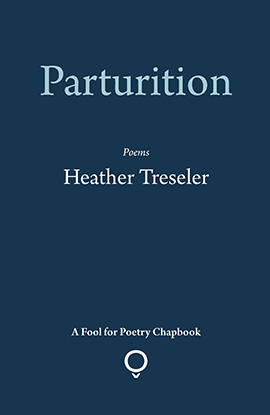by Alyse Knorr | Contributing Writer

Parturition
Heather Treseler
Southword Editions, 2020
Winner of the New England Poetry Club’s Jean Pedrick Chapbook Award and Munster Literature Centre’s international poetry chapbook prize, Heather Treseler’s Parturition is a stunning debut. Parturition opens with a poem about a woman eight months pregnant and caring for her dying mother. It establishes from the start the book’s main themes: motherhood and not-motherhood, birth and death, and the ways women’s bodies bear pain, both physical and emotional. In each encounter with another woman, be it a trip skinny-dipping with friends or an encounter with an anorexic, Treseler confronts the question: how can one come to freely own oneself?
The question is rooted firmly in the body. Treseler describes vulnerable bodies, diseased bodies, dead bodies, unborn bodies, bodies in their prime, and naked bodies in love. She also posits the body as metaphor: as landscape painting, boat, bread, or “fleshly doors that open to rapture or / metaphor.” In one poem, she identifies the exact location of the fetus inside the mother, “feet locked // against the pelvic gate.” In another, she renders the metamorphosis of the body after accident and trauma, describing a paralyzed loved one as a mermaid.
At the heart of the chapbook is a ten-part elegy to a friend called “The Lucie Odes,” which won the Missouri Review’s Jeffrey E. Smith Editor’s Prize. There isn’t nearly enough literature that treats friendship as seriously as romance, and “The Lucie Odes” offers a major intervention in this gap. In the friendship with Lucie, “I felt cherished as comrade, confidante / chérie,” Treseler writes. “In our evident brokenness, love’s / tacit fabric wove between us, incarnate.” The long poem memorializes Lucie by biographizing her, chronicling her escapes from an abusive mother and sex slavery as a young woman to her first meeting with the speaker in a night class, where the two were united by their need to learn how to “act / from half-wrecked bodies: my accident / a small occasion beside your catastrophe, // paralysis, metal chair.”
In these tender, exquisitely crafted verses, Treseler paints a beautiful portrait of Lucie in all of her idiosyncrasies and beloved details; she also describes the solace and exhilaration of the friendship—the flavor of the two women’s conversations or the opera they listened to together as they cooked. Almost the entire seventh section of the poem is in Lucie’s voice, offering a manifesto about how women should be “master” of their own bodies and fates, advising them “to hold / your body without lien or claim, boot or bank/or another’s name.” In Lucie, Treseler’s speaker learns how “to love another woman as if the self” and “to love another woman, as much / as the self.” This awakening into profound love becomes, too, an awakening into profound grief. In the stroke of a single line toward the end of the poem, Treseler bends time from a joyful erotic encounter to Lucie’s later death, both occurring in the space of the same bed. Ultimately, “The Lucie Odes” ties together all of the book’s themes of bodily trauma, motherhood, and metaphor, as the loss of Lucie, “more than mother or lover and both,” leaves the speaker “raw for shelter: each woman’s house built / on the long bones and breath of a mother.”
Treseler is not only a formal virtuoso, pouring lush meandering sentences into elegant long lines, but also a master of soaring similes and daring, resonant metaphors. A pregnant woman’s belly is “ovoid as an imperial Fabergé // egg on the eve of the Bolshevik Revolution” while an anorexic woman is marked by a “bird’s nest of chest bones.” Treseler’s poems feel as hard as they think, evidenced especially in her synesthetic descriptions like her image of ancient Greek slaves rowing a ship, “their nakedness whipped / by leather sun.” And while Treseler’s rich painterly descriptions are rooted in the senses—the smell and feel of a hot day in Baton Rouge or the sound of trains on their way into the city—they quickly leap out of their scenes into timeless, transcendent philosophy about the logic of metaphor and “the shared violence that marks birth and death.”
—
Heather Treseler‘s Parturition (2020) won Munster Literature Centre’s international poetry chapbook prize, and her sequence of poems, “The Lucie Odes,” won Missouri Review‘s Jeffrey E. Smith Editors’ Prize. Her poems appear in Cincinnati Review, The Iowa Review, and Harvard Review, and her essays about poetry appear in the Los Angeles Review of Books, PN Review, and in six books of criticism. She is associate professor of English and the Presidential Fellow for Art, Education, and Community at Worcester State University and a visiting scholar at the Brandeis Women’s Studies Research Center.
Alyse Knorr is an assistant professor of English at Regis University and, since 2017, co-editor of Switchback Books. Her most recent book of poems, Mega-City Redux, won the 2016 Green Mountains Review Poetry Prize, selected by Olena Kalytiak Davis. She is also the author of the poetry collections Copper Mother (Switchback Books 2016) and Annotated Glass (Furniture Press Books 2013); the non-fiction book Super Mario Bros. 3 (Boss Fight Books 2016); and four poetry chapbooks. Her work has appeared in Alaska Quarterly Review, Denver Quarterly, Columbia Poetry Review, The Greensboro Review, and ZYZZYVA, among others. She received her MFA from George Mason University.
